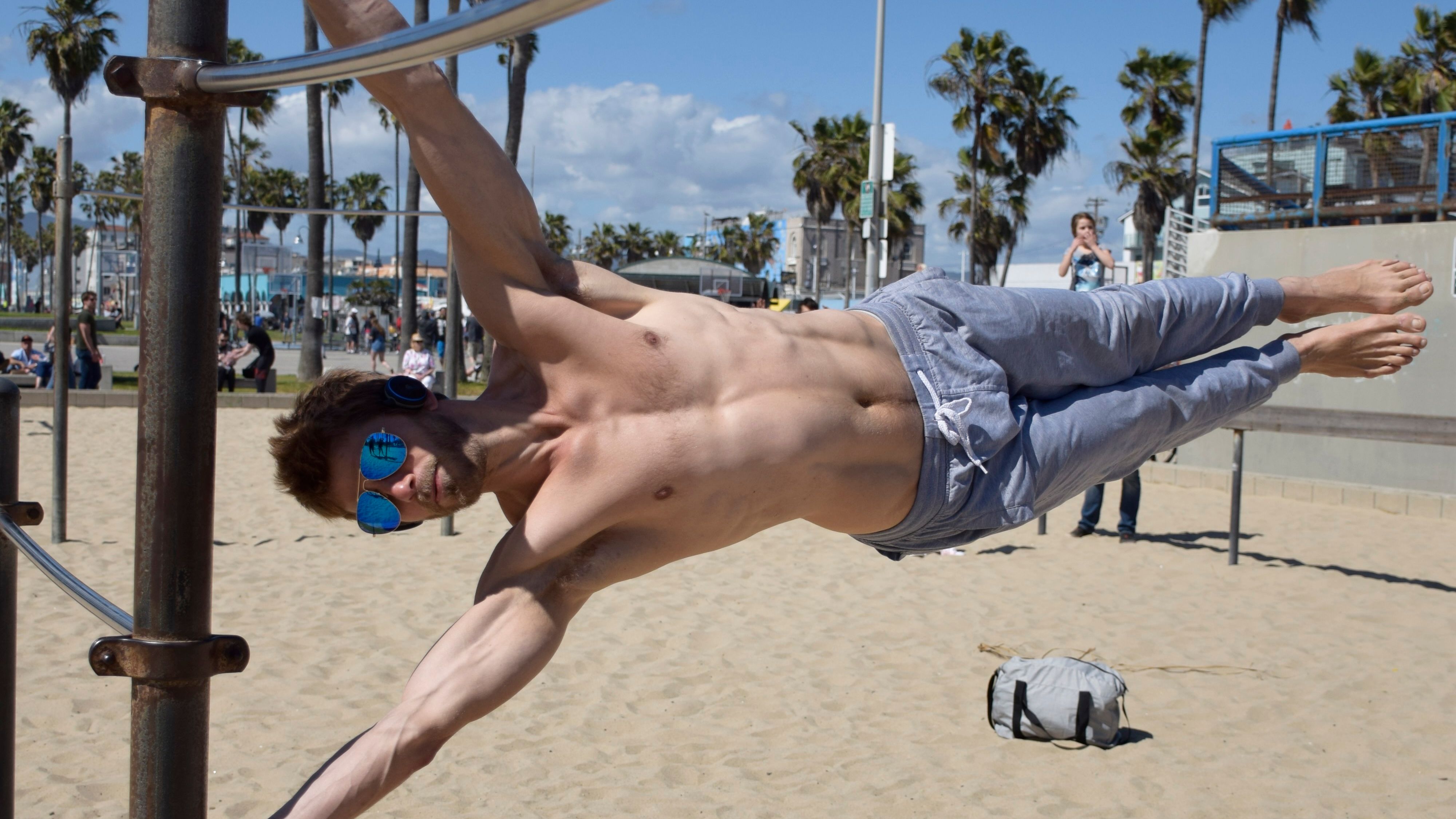From Zero to First Pull-Up: The Definitive 6-Step Progression Guide

From Zero to First Pull-Up: The Definitive 6-Step Progression Guide
The pull-up is the gold standard for upper-body functional strength.
If you can’t do one yet, your body is missing essential pulling strength, stability, and control.
This 6-step guide uses mandatory progressions to build strength safely and quickly.
Mandatory Prerequisite: Grip Strength
You must be able to hold the bar for at least 30 seconds before beginning this guide. If your grip gives out first, work on dead hangs and standing pull ups, until you meet this requirement (see Step 1).
Step 1: The Dead Hang (Grip & Shoulder Health)
This step focuses on grip endurance and shoulder mobility.
-
Execution: Grab the bar with a pronated (overhand) grip, just outside shoulder-width. Fully extend your arms, but don't let your neck sink into into your shoulders, keep your shoulders under your ears. Ensure a posterior pelvic tilt (tuck your hips back slightly) to engage your core and prevent back arching.
-
Go
...
Your Calisthenics Diet: What to Eat to Build Muscle and Get Ripped

Your Calisthenics Diet: What to Eat to Build Muscle and Get Ripped
You can have the most perfect calisthenics routine, but without the right fuel, your body simply won't build muscle or shed fat effectively.
The principles of nutrition are the same whether you lift weights or your body: calorie balance and macronutrient management.
This simple guide will help you determine your intake for two primary goals: Bulking (Muscle Gain) and Cutting (Fat Loss).
Note that most people don't need to bulk despite what they think!
1. Find Your Starting Point: Total Daily Energy Expenditure (TDEE)
Your TDEE is the number of calories your body burns in a day. You can find many free online TDEE calculators; simply input your height, weight, age, and activity level (select "Moderately Active" or "Active" if you train 3-5 days per week).
-
TDEE Example: A typical 160-pound man who trains 3 times a week might have a TDEE of around .
2. Determine Your Calorie Goal (The Calori...
Calisthenics vs. Weightlifting: Which Is Best for Your Fitness Goal?

Calisthenics vs. Weightlifting: Which Is Best for Your Fitness Goal?
The debate between training with your body weight (Calisthenics) and external weights (Weightlifting/Resistance Training) is one of the most common in fitness.
The simple truth, supported by recent research, is that neither is inherently "better."
Instead, each method excels at achieving specific fitness goals.
The decision hinges entirely on whether you prioritize Relative Strength, Overall Hypertrophy and Functional Mastery (Calisthenics) or Maximal Strength and Targeted Hypertrophy (Weightlifting).
1. The Scientific Verdict on Strength and Size
Recent studies have debunked the idea that bodyweight training cannot build muscle.
Provided the principle of Progressive Overload is met (challenging the muscles incrementally), both methods are highly effective.
-
Muscle Growth (Hypertrophy): A study comparing push-up training to bench press training over 8 weeks found no significant difference in chest and
...
Sprint Training: The Evolutionary Bodyweight Fitness Hack Backed by Science
Sprint Training: The Evolutionary Fitness Hack Backed by Science
Sprint training is a powerful, time-efficient workout that involves short, all-out bursts of speed (90-100% maximum effort) followed by controlled recovery.
This intensity, though brief, triggers dramatic biological adaptations that go beyond typical long-distance running.
It is an "evolutionary hack" that optimizes the body, leading to benefits in muscle building, fat loss, hormone balance, and cognitive function.
Click here to learn how to incorporate sprinting in your weekly training!
| Benefit | Scientific Mechanism & Citation |
| Superior Fat Loss | Sprint Interval Training (SIT) resulted in 39% greater body fat reduction than High-Intensity Interval Training (HIIT) with 61% less exercise time. It also caused 90% greater fat reduction than Moderate-Intensity Continuous Training (MICT) in 70% less time. (Meta-analysis, 2024) |
| Increased VO2 Max & Endurance | Three weeks of SIT can increase VO2 Max (maxim | ...
Calisthenics for Hypertrophy: The Science of Building Muscle Mass with Bodyweight

Calisthenics: The Science of Building Muscle Mass with Bodyweight
The most common myth in the gym world is that you need heavy barbells to build significant muscle mass.
But the truth is, the body doesn't care if the resistance comes from an iron plate or the leverage of your own body.
The Short Answer: Yes, you absolutely can build serious muscle mass with calisthenics.
For reference, I'm 6'1, 180lbs. My goal has always been to move better rather than get bigger.
However, I did gain a lot of lean mass over the years.
So now at 45 years old, while my overall mass is stable, my body composition is improving over the years.
The key is understanding and applying the principle of Progressive Overload without using traditional weights.
1. The Core Principle: Progressive Overload (The Real Secret)
Muscle growth (hypertrophy) occurs when you provide a stimulus (tension/force) that is greater than what your muscles are currently adapted to.
This forces them to repair and grow big...
Uneven Strength? Calisthenics is Your Ultimate Muscle Imbalance Fix
Uneven Strength? Calisthenics is Your Ultimate Muscle Imbalance Fix
Do you feel like one side of your body is stronger than the other? Do you notice that one arm or leg always takes over during a workout?
If you feel your body is uneven, you are dealing with a muscle imbalance, and you are far from alone.
This issue is extremely common, affecting athletes and everyday individuals alike.
Whether it is from a repetitive one-sided sport like tennis or simply favoring one hand in daily life, this asymmetry can hinder performance, compromise form, and even lead to chronic pain.
The great news? Calisthenics is the perfect, highly effective solution. You don't need fancy gym equipment to solve this structural problem.
You just need to strategically modify traditional bodyweight exercises to create controlled asymmetries. This is how you force your weaker side to catch up.
How Calisthenics Fixes Muscle Imbalances
By incorporating unilateral and asymmetrical movements into yo
...Calisthenics for Weight Loss: How to Start Even If You’re Overweight
Calisthenics for Weight Loss: How to Start Even If You’re Overweight
Are you asking yourself, "Can I start calisthenics if I'm overweight?"
The answer is absolutely yes!
Many people believe they have to lose weight before starting, but the truth is, calisthenics is a powerful engine for your transformation journey.
Stop waiting for the perfect moment. Calisthenics, or bodyweight training, will build muscle, boost your metabolism, and help you achieve movements you thought were impossible.
Essential Beginner Calisthenics Progressions
Forget needing to do a perfect pull-up or push-up immediately. The key is using progressive overload starting from your current level.
| Movement | Beginner Starting Point | Next Progression |
| Push-Ups | Wall Push-Ups or Knee Push-Ups | Negative Reps (Slow descent) |
| Pull-Ups | Australian Pull-Ups (Incline Rows) | Assisted Negatives (Jump up, slow down) or Resistance Band Pull-Ups |
| Dips | Box Dips (Using a bench) | Assisted Dips (Feet | ...
The Calisthenics Starter FAQ: Answering Your First 3 Questions

The Calisthenics Starter FAQ: Answering Your First 3 Questions
The world of calisthenics (bodyweight training) often seems intimidating, filled with images of people performing incredible, gravity-defying feats.
But the reality is, anyone can start.
I answer the most common barriers to entry below.
1. "Do I Need to Be Fit or Strong to Start Calisthenics?"
The Short Answer: Absolutely not.
Calisthenics is often misunderstood because the advanced movements (like the Planche or Muscle-Up) get the most attention.
-
The Power of Leverage: This is the core concept of bodyweight training. Instead of making an exercise easier by using lighter weights, we make it easier by changing the angle of your body to use less of your total weight.
-
Example: The Push-Up: If a standard push-up is too hard, you simply change your leverage:
-
Too Easy: Stand up and do a Wall Push-Up (
...
-
-
Essential Calisthenics Gear: What You Actually Need (Budget to Advanced)

Essential Calisthenics Gear: What You Actually Need (Budget to Advanced)
1. The Absolute Essentials (The "Must Have Nothing")
-
You do not need equipment to achieve 80% of your initial progress.
-
Your first month or two should focus solely on the progressions outlined in the beginner plan (push-ups, squats/kunges, rows, hollow body and planks).
-
The True Essentials:
-
A Sturdy Door/Wall: For rows and wall-assisted handstands.
-
Comfortable Shoes (or Barefoot): For squats, lunges, and jumping exercises.
-
Workout Clothes & Towel: For comfort and hygiene.
-
2. Tier 1: The First 3 Purchases (Under $100 - Crucial for Pulling & Progression)
This tier is vital because it solves the biggest calisthenics problem: the pull exercise.
You will find the best calisthenics equipment on Amazon here!
A. The Doorway Pull-Up Bar (The Calisthenics Pillar)
-
Why it's essential: Pull-ups and chin-ups are non-negotiable for upper body balance and back development. You c
...
Calisthenics Workout Program: 5 Beginner Moves That Build Real Strength

Calisthenics Workout Program: 5 Beginner Moves That Build Real Strength
You love watching amazing calisthenics feats, and you're ready to build that same strength.
That fire is exactly what you need!
Maybe a clean pull-up or solid push-up feels out of reach right now. That's great. It means you're at the beginning of an incredible journey.
Everyone starts here.
The key to success isn't raw talent; it's smart training.
You need to build a rock-solid foundation, and these specific beginner variations are your direct, successful path to those impressive skills.
Your Beginner Roadmap: 5 Moves to Guaranteed Strength
Forget thinking these are "easy" alternatives. These movements are tough, targeted tools that forge the strength you need for advanced skills. Master these, and you open the door to everything else.
1. Own the Australian Row: Pull-up Power on an Incline
The standard pull-up feels impossible? The Australian Row is your answer. It builds powerful back muscles
...
